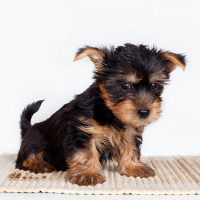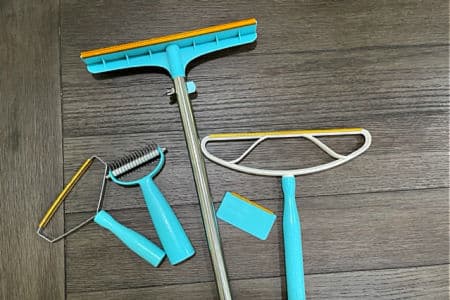FYI: If you buy something through a link on this site I may earn a commission - at NO extra cost to you.
Dog Incontinence Treatment
Dog incontinence treatment options vary, depending on what's causing your dog's urinary problems.
Sometimes the loss of bladder control is the whole problem, other times it's just a symptom of another underlying issue.
It's also an involuntary behavior (in other words, your poor dog has no control over the leaky plumbing!).
The good news is that there are ways to help make an incontinent dog more comfortable, and to minimize the mess while treatment options are underway.
If Fido or Fifi is constantly dribbling urine, wets the bed at night, or seems to need to pee every 30 seconds, help is at hand!
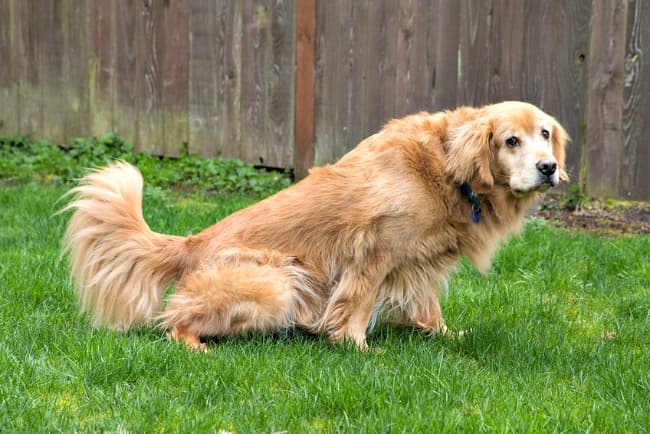
On this page you'll find help and advice for treating incontinence in dogs which is due to:
- Bladder Infection
- Spay Surgery
- Physical Defects
- Anxiety or Stress
- Disease
- Spinal or Neurological Conditions
- Age Related Incontinence
Managing Dog Incontinence takes organization and patience but it's very do-able and you'll find helpful tips and advice towards the bottom this page.
The Right Treatment For Dog Incontinence
There are lots of different reasons why your puppy or dog is having trouble controlling her bladder.
- Puppies can have immature nervous systems
- Older dogs often lose muscle tone which can affect any part of their bodies
- Several common dog illnesses and conditions can have incontinence a symptom
Figuring out what is at the root of your dog's problem is the key to treating her effectively.
Treating Your Dog's bladder Infection
Bladder infections are a fairly common cause of incontinence in dogs and happen most often in female dogs due to their shorter urethras.
They're caused by bacteria which can flourish in the bladder for a number of different reasons and the only real cure for a dog bladder infection is a course of the correct, and specific, antibiotics.
When diagnosed early and treated promptly the antibiotic is usually efficient in eliminating bacteria.
Bladder stones, which can cause UTI's in dogs, can sometimes be treated with dietary changes, or there are surgical options available if these fail.
To find out everything you need to know about treating dog bladder infections, CLICK HERE.
There are also natural products which can help ease symptoms, or can be effective in preventing bladder infections from developing.
These work by keeping your dog's urinary tract functioning properly, and are valuable when used regularly but I wouldn't rely on them to cure an active infection.
If your pup/dog has recurrent UTI's, Petwellbeing Urinary Gold contains natural ingredients that help to regulate the ph balance of her bladder and strengthen her immune system.
PetAlive UTI-Free is designed to relieve and soothe the symptoms of a urinary tract infection as well boosting immune function and preventing future recurrences.
PetAlive Better Bladder Control Granules (also available in spray form) is a homeopathic product which strengthens weak sphincter muscles and improves bladder control to put an end to dribbling. It can be a great choice for older dogs.
Treating Incontinence In Dogs After Spay Surgery
With somewhere between 5% and 20% of dogs experiencing some degree of incontinence (ranging from minor and temporary to more severe and long-lasting), hormone-responsive incontinence is a definite issue.
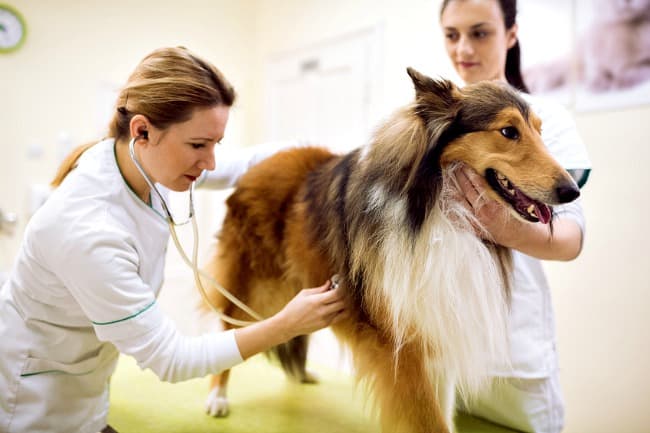
Sometimes localized swelling or 'trauma' from surgery, or the effects of anesthesia or strong pain-killers, can cause your dog to lose control of her bladder for a few hours, or a few days after surgery. This is temporary and your girl should be back to normal soon.
In other cases the change in hormone levels (drop in estrogen) can be behind the sudden leaky faucet. This can happen immediately after surgery or weeks, months or even years later.
If your dog has problems with bladder control after being spayed, and they don't resolve themselves within a few days, then this is something to consider.
Luckily the treatment for spay-related incontinence is usually easy, and effective.
A medication that tightens the sphincter muscles (between the bladder and ureter) might be used. There are several to choose from including Propalin and Proin which contains the active ingredient Phenylpropanolamine (aka PPA), a form of decongestant.
The drug Imipramine is also sometimes prescribed by veterinarian to treat incontinence, either by itself or alongside other medications.
Estrogen supplements or replacements are often effective too.
In 2011 the FDA approved a drug called 'Incurin' which contains the natural estrogen hormone estriadol.
Dog Incontinence Treatment - Incurin
Incurin is a fairly new drug, and so extended studies on side effects aren't available. Generally these are considered to be mild and include loss of appetite, excessive water consumption and swollen vulva area.
However, some owners have noticed significant behavioral changes in their dogs while taking Incurin.
Although some behavior change isn't unexpected (given that this drug is a hormone replacement), they shouldn't be severe.
Extreme friendliness toward other dogs (to the point of being obnoxious), or heightened aggressiveness or anxiety, are not normal and I'd recommend discussing any sign of these with your own veterinarian.
Diethylstilbestrol (aka DES a synthetic estrogen) is also used, and sometimes a combination of PPA and DES is recommended.
Which drug is prescribed/recommended depends on the individual circumstances and the severity of the problem. It's your vet's call.
For male dogs with hormone-related incontinence sometimes testosterone injections can relieve the symptoms.
But, this might cause a rise in other male behaviors such as scent-marking that are common in un-neutered dogs.
Alternative and natural treatments can help in some cases. Herbal blends and supplements, acupuncture and homeopathic options have all had positive results in some dogs.
Incontinence Caused By Physical Defects
If your pup or dog has some type of malformation or defect in her urinary tract that is causing her loss of bladder control, then surgery is her best option.
Ectopic Ureter, which is a congenital defect where the ureter doesn't carry urine to the bladder, can often be corrected surgically, but it isn't a 'sure thing'.
If your vet suspects this is a problem for your pup, first he'll use a physical exam, urine analysis and most likely X-rays, ultrasound or a CT scan to make an accurate diagnosis (and to see exactly how the ureter is placed and where it empties).
Studies show that approximately half of these surgeries will be a complete success.
For the other half, the dog's incontinence will usually be improved, but not necessarily completely removed.
In those cases medication can often help clear up remaining symptoms.
Dog Incontinence Due to Neurological, Spinal Problems
Your dog's nervous system is controlled by a set of impulses and signals that set out from his brain and then travel through his body via his spinal column and nerves.
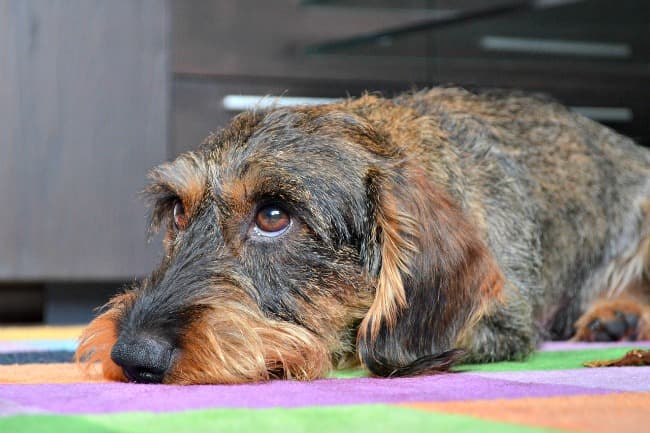
This means that any injuries or disease of the brain, spine or nervous system can cause problems in any other part of the body, including bladder/bowel control.
In these situations it's not the incontinence that needs to be fixed so much as the injury or disease that's causing the incontinence.
Because there are so many different possibilities such as brain or spinal tumors, degenerative diseases, injuries, inflammation and so on, there's no way to give you one treatment option.
If your dog's incontinence is also accompanied by other symptoms such as weakness or lameness in the rear, loss of co-ordination or balance, seizures, difficulty with bowel movements and so on, then it's worth considering neurological issues being at the root of his problem.
You'll need your vet to give him a thorough check-up and take it from there.
Incontinence As A Symptom Of Other Diseases
As with the incontinence that is a result of a neurological or spinal problem, it can also show up as a symptom in a whole host of other illnesses and diseases.
Loss of bladder control or excessive urination can be caused by:
- Diabetes
- Cushing's Disease
- Addison's Disease
- Kidney
- Liver problems
- Tumors
- Diseases of the urinary tract
- Prostate problems
......and more.
The key to which disease/condition is at the root of the problem is usually found in the other symptoms that you're seeing.
Excessive thirst, hair loss, weight loss (or weight gain), changes in appetite, fatigue, diarrhea, vomiting, panting/pacing or signs of stress or pain, and so on are all symptoms that you should pay attention to.
If your dog has problems controlling her/his urine, and other symptoms of illness (or just seems 'off' to you in some way), it's definitely worth having your veterinarian take a closer look and find out what's at the root of the problem.
Once you treat the underlying health condition, her bladder control will return.
Anxiety And Dog Incontinence
Losing bladder control (and sometimes bowel control too) can be a symptom of psychological problems as well as physical ones.
A puppy or dog who is seriously stressed or in a state of high-anxiety can get so upset that their emotions literally overtake their physical self-control and the result can be a puddle (or worse).
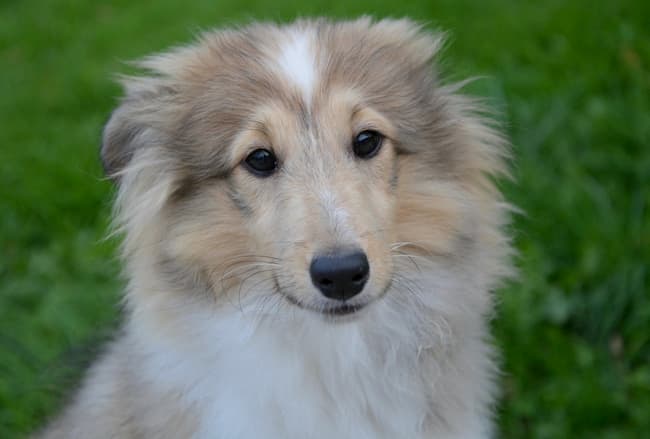
Submissive urination is a prime example of involuntary loss of bladder control, and it's NOT a house-training issue or a physical limitation, it's a behavioral one.
It's an involuntary behavior and your pup/dog can't help it if she piddles at the feet of a stranger, or when she meets a dog she doesn't know, or hears the vacuum cleaner, or......
Getting cross with her will only make the situation worse. If you click on the link in the earlier paragraph you can learn how to handle submissive urination in a way that will help her overcome her 'issues'.
True separation anxiety is another thing that can make your pup lose control of her bodily functions.
If she gets hysterical when left alone, the level of her fear can make her behave in a 'wild' way. Howling, scratching, throwing herself around, even peeing and/or pooping uncontrollably.
You need to find a way to reduce her anxiety and fear, then the other behaviors will also resolve themselves.
Incontinence In Older Dogs
Senior dogs are more likely to develop health problems which can have incontinence as a symptom, this is a normal part of aging and the deterioration of their body's functions.
As they get older they also lose muscle tone and the sphincter muscle isn't exempt from this, so urine can leak out when it's not supposed to.
But, just because a dog is older, that doesn't mean that his incontinence can't be treated, or at the very least managed.
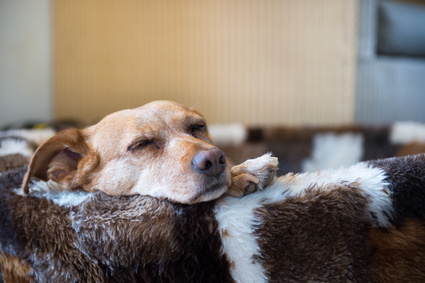
Managing Incontinence In Dogs
Obviously it's most important to treat whatever is causing your dog to have trouble with her bladder control.
It's also important to try to help relieve the discomfort and keep your home from being constantly damp.
- Doggie diapers for girls and belly bands for boys can be a Godsend if you have a dog who is constantly dribbling urine. There are disposable and washable options and most dogs tolerate them well. (I have a big German Shepherd who even as an adult will pee submissively at times, I use extra large Pet Parents premium washable dog belly bands for him when we have company and they're great. Adjustable and absorbent. If your dog is urine incontinent, especially if he/she is a large breed, I'd recommend adding disposable dog diaper pads for extra absorbency).
- Find a water-resistant dog bed, and put rubber or plastic-backed blankets (you can make these yourself) on furniture or beds.
- If you have a small-breed dog, consider adding pee-pads or a doggie litterbox to each room so that your dog doesn't have far to go if she gets a sudden urge to pee.
Some additional side-effects of dog incontinence can be 'scalding' (basically when the acid in urine burns the skin), inflammation and infection.
You can relieve discomfort caused by urinary incontinence by:
- Keeping your pets skin clean and dry can go a long way towards reducing these issues.
- Use baby wipes (unscented), medicated wipes, or unscented soap and water to keep the tummy area clean. Use just plain lukewarm water for the vulva or tip of the penis if necessary.
- If the skin is just irritated, a little vaseline petroleum jelly or aloe vera gel can be soothing.
Remember that your dog is likely to be licking this area, a lot, so don't use anything that might be toxic (including diaper rash cream that contains zinc)
But if there's a lot of redness, swelling or the area feels hot, chances are there's some infection there and you'll need to get antibiotics and/or anti-inflammatory medications from your vet.
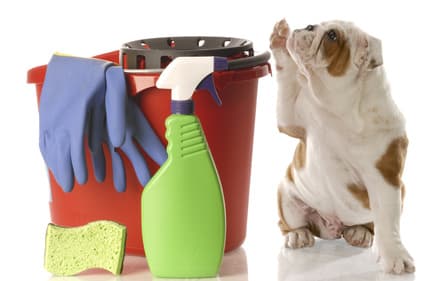
A good urine and odor remover is worth having on hand to clean up dribbles and puddles.
Also, a good supply of patience and a lot of love is necessary.
Remember, your dog can't help dribbling or flooding, there's something wrong and she's relying on you to help her get better.
Don't limit her water intake (unless your vet recommends it as part of her treatment) in an effort to reduce the amount of pee she produces.
This is more likely to lead to dehydration or a UTI which will just make the situation worse, not better.
There are natural supplements which can help improve your dog's bladder health and function (but they're not a cure of incontinence).
Occasionally, incontinence can be caused by a sensitivity or allergy to a dog food ingredient or is linked to medication or supplement.
Grains can be one of the problems in dog food, and switching to a grain-free diet or preparing your dog's food at home can sometimes help.
Click on the following link to read a comprehensive article about dog incontinence treatment written exclusively for fidosavvy.com by Dr. Megan Teiber, DVM
you might also like...
- Home
- Dog Health Information
- Dog Incontinence
- Dog Incontinence Treatment
FTC Disclosure: Some pages on this site contain affiliate links. I may earn on qualified purchases.


